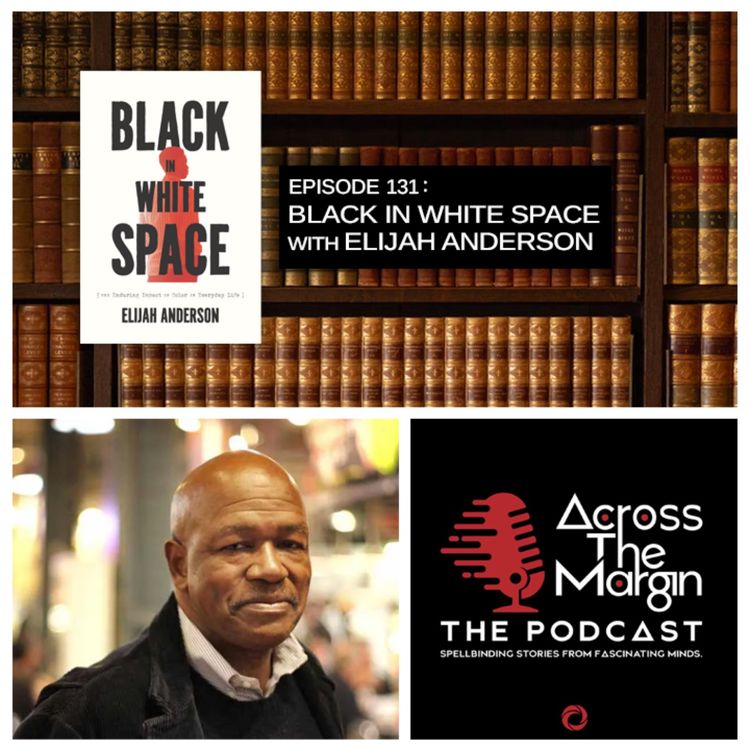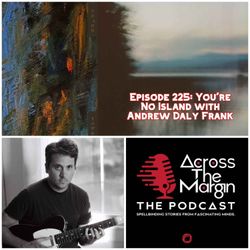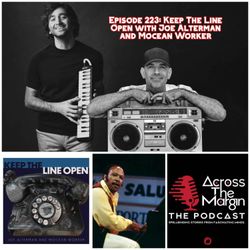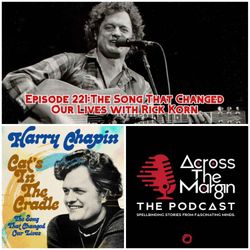Share

Across the Margin: The Podcast
Episode 131: Black In White Space with Elijah Anderson
In this episode of Across The Margin : The Podcast host Michael Shields interviews Elijah Anderson, the Sterling Professor of Sociology and of African American Studies at Yale University. Anderson is one of the leading urban ethnographers in the United States and his publications include Code of the Street: Decency, Violence, and the Moral Life of the Inner City (1999); Streetwise: Race, Class, and Change in an Urban Community (1990); and the classic sociological work, A Place on the Corner (1978). He also wrote The Cosmopolitan Canopy: Race and Civility in Everyday Life (2011) and his latest book — the subject of this episode — is Black In White Space which sheds fresh light on the dire persistence of racial discrimination in our country. A birder strolling in Central Park. A college student lounging on a university quad. Two men sitting in a coffee shop. Perfectly ordinary actions in ordinary settings — and yet, they sparked jarring and inflammatory responses that involved the police and attracted national media coverage. Why? In essence, Elijah Anderson would argue, because these were Black people existing in white spaces. In Black In White Space, Anderson brings his immense knowledge and ethnography to bear in this timely study of the racial barriers that are still firmly entrenched in our society at every class level. He focuses on symbolic racism, a new form of racism in America caused by the stubbornly powerful stereotype of the ghetto embedded in the white imagination, which subconsciously connects all Black people with crime and poverty regardless of their social or economic position. From Philadelphia street-corner conversations to Anderson’s own morning jogs through a Cape Cod vacation town, he probes a wealth of experiences to shed new light on how symbolic racism makes all Black people uniquely vulnerable to implicit bias in police stops and racial discrimination in our country. Throughout this episode Michael Shields and Elijah Anderson discuss how Black In White Space is part of a larger, and critically important, body of work by Anderson. They define and explore the role of ethnographers in social science while breaking down the idea of symbolic racism, the ghetto as a symbol and a mental space, places that Anderson defines as “cosmopolitan canopies,” and so much more.
More episodes
View all episodes

Episode 228: What Do You Do When You're Lonesome with Jonathan Bernstein
52:57|This episode of Across The Margin : The Podcast features an interview with Jonathan Bernstein, a senior research editor and writer at Rolling Stone, who before that was a freelancer for Oxford American, The Guardian, GQ, Vulture, Pitchfork, The Village Voice, Spin, Entertainment Weekly, and American Songwriter. His book, What Do You Do When You’re Lonesome : The Authorized Biography of Justin Townes Earle, is the focus of this episode. In What To Do When You’re Lonely, Jonathan Bernstein, with the full cooperation of the Justin Townes Earle estate, unravels a short but incredibly creative life, and reveals the backstories behind Justin’s greatest songs and what happened when it all fell apart while also capturing a shadow world of the neglected children of Nashville legends who wrestle with the legacies of their hard-living, road-weary, often absent parents.
Episode 227: Michael Townsend's Secret Mall Apartment
34:37|This episode of Across The Margin : The Podcast features an interview with artist and educator Michael Townsend. Michael is the founder of the Tape Art movement and for over 30 years, he has created hundreds of ephemeral murals and community projects around the world. His work includes the 9/11 Hope Project, the invention of the BOOM! Projector, and the now-legendary documentary Secret Mall Apartment. Directed by Jeremy Workman and executive produced by Jesse Eisenberg, the critically acclaimed documentary follows Michael and his collaborators, who, in 2003, secretly built and lived in an apartment inside Providence Place Mall for four years. What started as an underground protest against gentrification has become a cultural phenomenon, a story about art, resistance, and community. At the center of the film is Michael Townsend, the artist whose work sparked the story. Michael has found a way to live his art, and give back to his community and the country all the while, from teaching collaborative drawing in hospitals and schools, and building projects designed to disappear physically but endure culturally. The mall apartment was one project among many — a piece of protest art that happened to be documented, and in this episode host Michael Shields and Michael Townsend delve into Michael’s motivations, his enduring and inspiring work with Tape Art, the blended line between art and everyday living that defines Michael’s life, and so much more.
Episode 226: Plan C For Civilization with Ben Kalina
35:41|This episode of Across The Margin : The Podcast features an interview with award-winning director and producer Ben Kalina, whose work centers on the collision between human nature and the force of nature. In 2020 he produced and directed Can We Cool the Planet? for NOVA. His film Shored Up, the 2014 Sundance Institute LightStay Sustainability Award winner, explored rising sea levels and the politics of Climate Change in the U.S. in the aftermath of Hurricane Sandy. He was Associate Producer of A Sea Change, broadcast on Discovery’s Planet Green in 2009, and Two Square Miles, broadcast on PBS’ Independent Lens in 2006. Ben’s production company, Mangrove Media, is based in Philadelphia where he is an Assistant Professor in the Film and Television Program at Drexel University. His latest documentary — Plan C For Civilization — is the focus of this episode. Plan C for Civilization tackles the promise and peril of solar geoengineering with exclusive verite access to its protagonist David Keith and the SCoPEx project as well as the rogue geoengineers of Make Sunsets. From Bangladesh to Nevada, the extremely controversial promise of solar geoengineering is emerging after more than 60 years in the shadows, and with it, a new chapter of the Climate Change saga.
Episode 225: You're No Island with Andrew Daly Frank
33:03|This episode of Across The Margin : The Podcast features an interview with singer-songwriter and guitarist Andrew Daly Frank. Andrew is an inimitable songwriting voice and virtuosic guitarist, and his debut album, You’re No Island — the focus of this episode — is a gorgeous, affecting piece of art that is pacifying and vitalizing. Andrew is a guitarist who has lent his thrilling leads and delicate chordal touch to albums by Charlie Kaplan and released a series of beguiling EPs in the lead up to You’re No Island. Andrew’’s arrangements on You’re No Island are both intimate and expansive, and he emerges here as an auteur in his own right, a songwriter of uncommon wisdom and an architect of subtle musical effects. In this interview host Michael Shields and Andrew Daly Frank discuss the genesis of You’re No Island and the ways in which the songs on it took shape over the past five years. They talk about the cunning lyricism found on the album, Andrew’s musical influences, and so much more. Songs featured in the episode: “Alone in the Frame,” “Someone Somewhere,” “Lisbon.”
Episode 224: The 90s Jam Band Explosion with Mike Ayers
56:35|This episode of Across The Margin : The Podcast features an interview with author and seasoned music and culture journalist, Mike Ayers. Mike has had work published in Billboard, The Wall Street Journal, Rolling Stone, Time, Esquire, and Relix. His first book, One Last Song: Conversations on Life, Death, and Music came out in 2020, with Variety declaring it as one of the best music books of the year. His latest book, Sharing in the Groove: The Untold Story of the '90s Jam Band Explosion and the Scene that Followed, is the focus of this episode Sharing in the Groove is a rich examination of an underdog genre that helped define the 1990s musical landscape — a scene that paved the way for modern-day cultural institutions such as the Bonnaroo Music Festival and kept the Grateful Dead ethos alive. Beginning in the mid-’80s and traveling up to New Year’s Eve 1999, Sharing in the Groove covers milestones such as getting signed to record labels and working the club scenes to playing amphitheaters and arenas. Along the way, details emerge of the scene’s own cultural values and the desire to be unique in a world that wanted them to follow a prescribed path. Ultimately, it’s a DIY story of creativity and making music — and how that won over a huge audience. Filled with anecdotes and stories directly from the musicians, promoters, managers, roadies, producers, label executives, and fans who lived this scene, Sharing in the Groove is a fun, fast-paced oral history that will appeal to music lovers everywhere.
Episode 223: Keep The Line Open with Joe Alterman and Mocean Worker
50:28|This episode of Across The Margin : The Podcast features an interview with bassist/producer Mocean Worker (aka Adam Dorn) and pianist/composer Joe Alterman, who have come together for Keep The Line Open, a funky, feel-good tribute to the late soul jazz legend Les McCann. Keep The LIne Open remarkably taps into the genre-blurring spirit that defined McCann’s music, as well as his influence on Joe and Adam. Both Joe and Adam called Les McCann a friend, collaborator, and mentor. Joe was a devotee of Les who had the rare opportunity to open for his hero, and later craft songs with him. Adam met Les through his dad, Joel Dorn, who produced several Les records for Atlantic Records, including the iconic Swiss Movement. Adam and Joe created Keep The Line Open by melding sampling with live instrumentation to pay homage to an era when the groove reigned supreme and the vibe was decidedly danceable. It’s a super fun and funky sonic journey designed to sound like it was captured at a jazz club circa 1964. Learn all about it and more in this episode.
Episode 222: Organize or Burn with Fabian Holt
48:49|This episode of Across The Margin : The Podcast features an interview with Fabian Holt, Associate Professor in the Department of Communication and Arts at Roskilde University. He is the author of Everyone Loves Live Music: A Theory of Performance Institutions. His latest book, Organize or Burn : How New York Socialists Fight For Climate Survival, is the focus of this episode. Climate inaction is already causing widespread suffering and devastation around the world. How can citizens take collective action? Fabian Holt argues that we must go beyond protest and direct action, and turn to the potential of hybrid organizations that bring together social movements and political parties. One such “movement party” with recent political success is the New York City chapter of the Democratic Socialists of America (NYC-DSA), which has become the city’s main organization for movement climate politics, running multi-year climate pressure campaigns and a slate of climate-focused electoral campaigns, Organize or Burn situates the NYC-DSA in the history of the Democratic Socialist movement in the United States, In it, Fabian contests that NYC-DSA has developed a distinct approach to political organizing that has broad relevance to citizen climate mobilization. Ultimately, Organize or Burn shows that NYC-DSA can offer powerful lessons in how political collective action can be meaningful in the present moment of political turbulence.
Episode 221: The Song That Changed Our Lives with Rick Korn
31:02|This episode of Across The Margin : The Podcast features an interview with film and TV producer, writer, and director Rick Korn. Rick is the co-founder of In Plain View Entertainment which specializes in creating socially conscious documentaries. Rick has produced benefit concerts with Bruce Springsteen, Bon Jovi, Sheryl Crow, Peter Frampton, Kevin Bacon, and Joan Jett (amongst others). He executive produced the documentary about Paul McCartney, My Old Friend, and in 2024, he directed and released A Father’s Promise, the inspiring story of professional musician Mark Barden who lost all joy in music when his son Daniel was murdered at Sandy Hook Elementary school. Mark rewired himself and became a powerful voice and activist when he co-founded Sandy Hook Promise. Rick’s latest documentary, the focus of this episode, is entitled Harry Chapin — Cat's In The Cradle: The Song That Changed Our Lives. This new documentary explores Harry Chapin’s deeply affecting folk song’s lasting impact on music and culture decades later. In it, reflecting on the song's universal themes of parenthood, time, and relationships, are legendary musicians Billy Joel, Pat Benatar, Judy Collins, Dee Snider (Twisted Sister), Darryl McDaniels (Run-D.M.C.), Mandy Patinkin, Robert Lamm (Chicago), Whitfield Crane (Ugly Kid Joe) and more. In this episode host Michael Shields and Rick discuss what it is about “Cat’s In The Cradle” that has affected generations of people from across the world so deeply. Join in on a celebration of Harry Chapin who was more than just a singer-songwriter; he was a storyteller, activist, and humanitarian whose life and music touched the hearts of millions.The documentary will benefit WhyHunger, Long Island Cares and the Harry Chapin Foundation.
Episode 220: Jenna Nicholls — The Commuter
34:34|This episode of Across The Margin : The Podcast features an interview with singer-songwriter Jenna Nicholls. Hailing from the small town of Irwin, PA near Pittsburgh, after college Jenna set her sights east to test her wings as a songwriter and performer. Initially trying Boston, she ultimately gravitated to the creative hotbed of Manhattan’s Lower East Side forging lasting friendships with other like-minded artists and musicians. Jenna made three albums on her own dime: Curled Up Toes in Red Mary Janes, The Blooming Hour, and Radio Parade. The albums revealed a restless muse and a theme that would be a constant for Nicholls: a love of vintage music – anything from classic music films like “Singin’ in the Rain” to Bessie Smith. Her latest album — The Commuter — is the focus of this episode. The title of Jenna Nicholls’ new album The Commuter is fitting in every sense — the story of a journey both musical and personal. The recording signals a departure and new beginnings: a new producer (multiple Grammy winner Larry Campbell), a new record label (Hudson Valley based Royal Potato Family), a lusher sound with inventive, fleshed-out arrangements, and an astoundingly wide-ranging collection of original songs. The constant: Jenna’s unique ability to transport the listener to a different place and time with her writing and inspired singing. The Commuter displays Jenna’s melodic and lyrical gifts in full flower. It’s a cinematic trip that takes the listener to 1930’s Parisian cafés, New Orleans juke joints, and beyond. It is an album that communicates the excitement of venturing forth and the reassurance of returning home to an abiding love. Learn all about it and more in this episode.